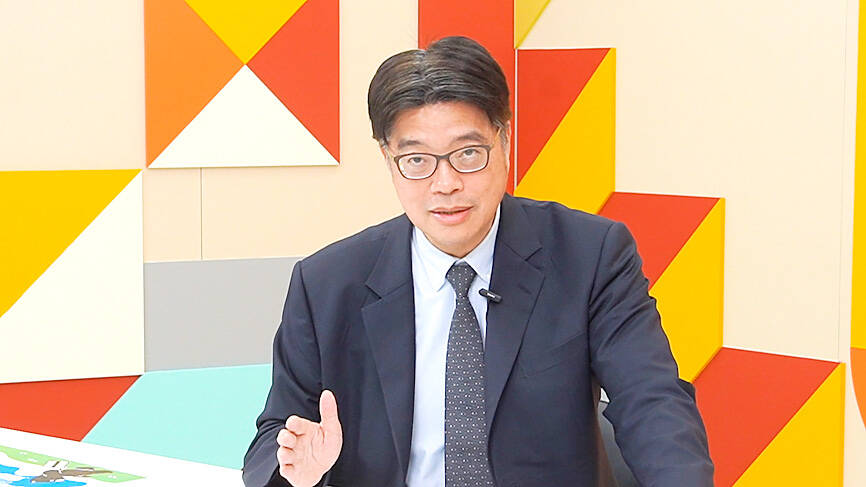Taiwan’s future cannot be contingent on the goodwill of Beijing, Mainland Affairs Council Minister Chiu Chui-cheng (邱垂正) said in an interview published yesterday by the Chinese-language Liberty Times (sister paper of the Taipei Times), while adding that the government would seek dialogue over confrontation.
The People’s Republic of China has since its founding refused to accept the fact that the Republic of China exists, and has resorted to various forms of threats to coerce Taiwan into accepting its “one China” principle, he said.
Taiwanese find China’s political preconditions for dialogue unacceptable, he said.

Photo: Huang Chun-hsuan, Taipei Times
“We do not accept narrow-minded and rigid ideological frameworks,” Chiu added.
Beijing’s military and economic threats, diplomatic oppression and other actions, including infiltration of Taiwanese society and the use of cognitive warfare, have caused the two sides of the Taiwan Strait to drift further away from each other, he said.
Such actions go against Chinese leaders’ comments that Taiwan and China should be spiritually intertwined, he added.
Chinese oppression of Taiwan is why it has become the target of an international “containment” policy, Chiu said, calling on Beijing to consider measures to facilitate a cross-strait thaw.
The nation’s future should not be contingent upon the “goodwill” of Chinese leaders, he said, adding that President William Lai’s (賴清德) four “pillars” of peace are key to realizing that goal.
In an op-ed in the Wall Street Journal in July last year, Lai defined the four pillars as building up the nation’s defense capabilities, promoting economic security and fostering supply chain resilience, forming partnerships with other democracies and maintaining steady and principled cross-strait leadership.
Commenting on Beijing’s recent guidelines allowing its courts to impose severe punishments on “die-hard Taiwanese independence advocates,” Chiu said they have a negative effect and undermine cross -strait relations.
They are a classic demonstration of “legal warfare,” he said, urging Taiwanese to reconsider non-essential visits to China, Macau or Hong Kong.
The guidelines are full of “uncivilized” practices, including long-arm jurisdiction, trials in absentia, confiscation of property and even extend to a target’s family, he added.
Chiu also called on Beijing to release the cerw of the fishing boat Da Jin Man No. 88 (大進滿88), which was detained by the China Coast Guard on Tuesday last week, as well as provide medicine for crew members who need them.

Trips for more than 100,000 international and domestic air travelers could be disrupted as China launches a military exercise around Taiwan today, Taiwan’s Civil Aviation Administration (CAA) said yesterday. The exercise could affect nearly 900 flights scheduled to enter the Taipei Flight Information Region (FIR) during the exercise window, it added. A notice issued by the Chinese Civil Aviation Administration showed there would be seven temporary zones around the Taiwan Strait which would be used for live-fire exercises, lasting from 8am to 6pm today. All aircraft are prohibited from entering during exercise, it says. Taipei FIR has 14 international air routes and

Taiwan lacks effective and cost-efficient armaments to intercept rockets, making the planned “T-Dome” interception system necessary, two experts said on Tuesday. The concerns were raised after China’s military fired two waves of rockets during live-fire drills around Taiwan on Tuesday, part of two-day exercises code-named “Justice Mission 2025.” The first wave involved 17 rockets launched at 9am from Pingtan in China’s Fujian Province, according to Lieutenant General Hsieh Jih-sheng (謝日升) of the Office of the Deputy Chief of the General Staff for Intelligence at the Ministry of National Defense. Those rockets landed 70 nautical miles (129.6km) northeast of Keelung without flying over Taiwan,

City buses in Taipei and New Taipei City, as well as the Taipei MRT, would on Saturday begin accepting QR code payments from five electronic payment providers, the Taipei Department of Transportation said yesterday. The new option would allow passengers to use the “transportation QR code” feature from EasyWallet, iPass Money, iCash Pay, Jkopay or PXPay Plus. Passengers should open their preferred electronic payment app, select the “transportation code” — not the regular payment code — unlock it, and scan the code at ticket readers or gates, General Planning Division Director-General Liu Kuo-chu (劉國著) said. People should move through the

The Ministry of National Defense (MND) today released images of the military tracking China’s People's Liberation Army (PLA) movements during the latest round of Chinese drills around Taiwan. The PLA began "Justice Mission 2025" drills today, carrying out live-fire drills, simulated strikes on land and maritime targets, and exercises to blockade the nation's main ports. The exercises are to continue tomorrow, with the PLA announcing sea and air space restrictions for five zones around Taiwan for 10 hours starting from 8:30am. The ministry today released images showing a Chinese J-16 fighter jet tracked by a F-16V Block 20 jet and the